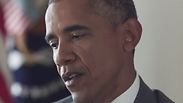
Defending an emerging nuclear deal, President Barack Obama said Iran would be kept a year away from obtaining a nuclear weapon for more than a decade, but conceded Tuesday that the buffer period could shrink to almost nothing after 13 or more years.
Obama, whose top priority at the moment is to sell the framework deal to critics, was pushing back on the charge that the deal fails to eliminate the risk because it allows Iran to keep enriching uranium. He told NPR News that Iran will be capped for a decade at 300 kilograms - not enough to convert to a stockpile of weapons-grade material.
"What is a more relevant fear would be that in Year 13, 14, 15, they have advanced centrifuges that enrich uranium fairly rapidly, and at that point, the breakout times would have shrunk almost down to zero," Obama said.
Breakout time refers to how long it would take to build a bomb if Iran decided to pursue one full-bore - in other words, how long the rest of the world would have to stop it. The framework deal expands Iran's breakout time - currently two to three months - to at least a year. But that constraint would stay in place only for 10 years, at which point some restrictions would start phasing out.
Although Obama acknowledged that Iran's breakout time could shrink, he said at least the world would have better insight into Iran's capabilities because of extensive inspections in the earlier years.
Related stories:
- Obama: Netanyahu 'misjudged' in demanding Iran recognize Israel as part of nuclear deal
- Netanyahu to US: Still time to reach better nuclear deal with Iran
- White House: Iran sanctions phase-out still to be negotiated
"The option of a future president to take action if in fact they try to obtain a nuclear weapon is undiminished," Obama said.
The stark admission came as the president seeks to quiet a growing chorus questioning whether the deal he and world leaders have negotiated merely delays the certainty of a nuclear-armed Iran. Obama has insisted confidently that Iran will not get a nuclear weapon on his watch, which ends in roughly 20 months, but has made no similar assurances about his successors.
Tehran has always maintained it doesn't want a nuclear bomb, but the international community has been skeptical, and America's close ally Israel considers a nuclear Iran an existential threat. US lawmakers and foreign policy hawks have questioned how Obama can strike a diplomatic deal with a country that continues to threaten Israel and tops the US list of state sponsors of terror.
Iran and the United States have irritated each other with conflicting statements made about the nuclear framework agreement reached last week in Switzerland.
Wendy Sherman, US undersecretary of state for political affairs, was asked about the different interpretations of the deal intended to curb Tehran's nuclear program in exchange for relief from economic sanctions.
"I think we've each been irritated with each other in some of the things we've said," Sherman told MSNBC in an interview. "Even though we discussed this before we left - we understood that our narratives were likely to be somewhat different - but we pledged to try not to contradict each other."
One sticking point has been when sanctions against Iran would end: Iran has said it expected all to be suspended as soon as the agreement takes effect. The United States said they would be phased out gradually, depending on Tehran's compliance.
Despite the different narratives, Sherman said the countries are in broad agreement on the framework. She added, though, much work remains to be done to fill out details by a June 30 deadline.
Revolutionary Guards chief praises deal
In Tehran, meanwhile, the chief of Iran's Revolutionary Guard praised the work of the country's nuclear negotiators after they struck a deal with world powers, state television reported, in what is considered a major endorsement from the Islamic Republic's most powerful institution.
The comments by Gen. Mohammad Ali Jafari came as some 200 hardliners protested in Tehran against the framework deal reached last week in Switzerland. Jafari's endorsement likely will isolate those still opposing the deal further amid the widespread support negotiators have received and may smooth any potential parliamentary vote over it.
"With God's grace, the revolutionary children of Islamic Iran have succeeded in defending the rights of the Iranian nation and the Iranian nation and the Guard appreciate their honest political efforts," Jafari was quoted as saying on state TV's website.
The Revolutionary Guard is the single most powerful institution in Iran. It exerts a strong behind-the-scenes role in Iranian affairs and likely would have to agree to any potential demands reached in negotiations, such as increased international monitoring at nuclear and related sites.
Iran's top leader Ayatollah Ali Khamenei, who has the final say on all major issues, including the nuclear program, has backed the negotiators, further stepping up the pressure on remaining hold-out hard-liners.
The rally Tuesday by 200 hardline protesters took place in front of the parliament in the Iranian capital as Foreign Minister Mohammad Javad Zarif briefed lawmakers there in a closed-door session. Iran's official IRNA news agency reported that the protesters launched their demonstrations without the permission of authorities.
Protesters carried banners calling the agreement a "defeat" - despite the overwhelming backing of the deal by the government of moderate President Hassan Rouhani.
The deal, which is to be finalized by June 30, is to curb Iran's bomb-capable technology while giving Tehran quick access to bank accounts, oil markets and financial assets blocked by international sanctions.
Reuters contributed to this report.
















